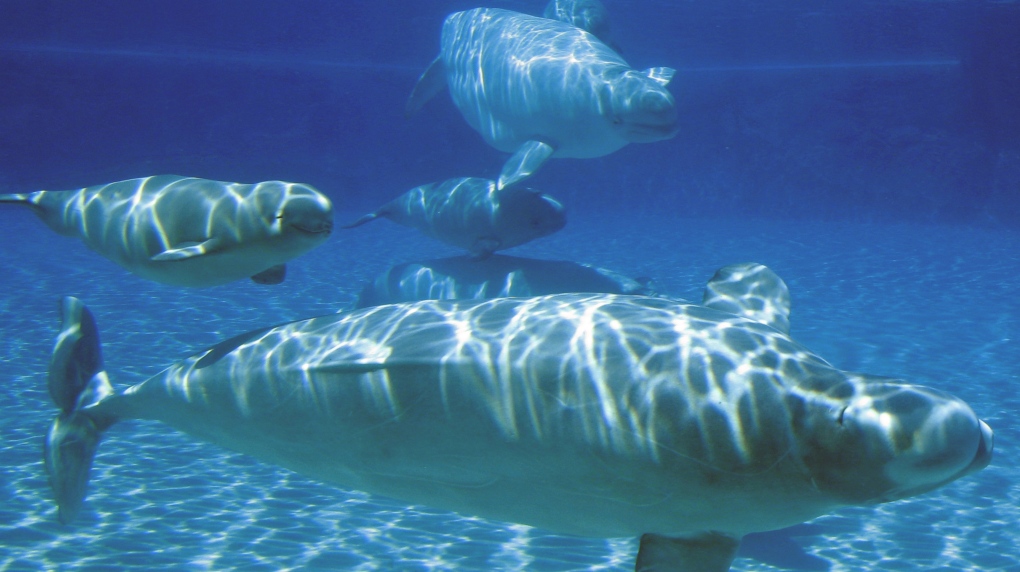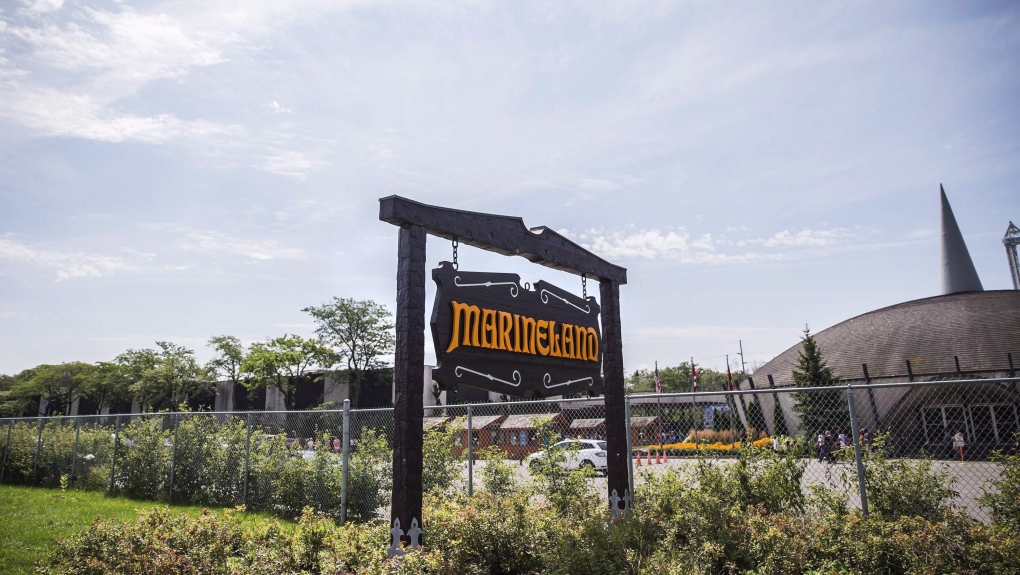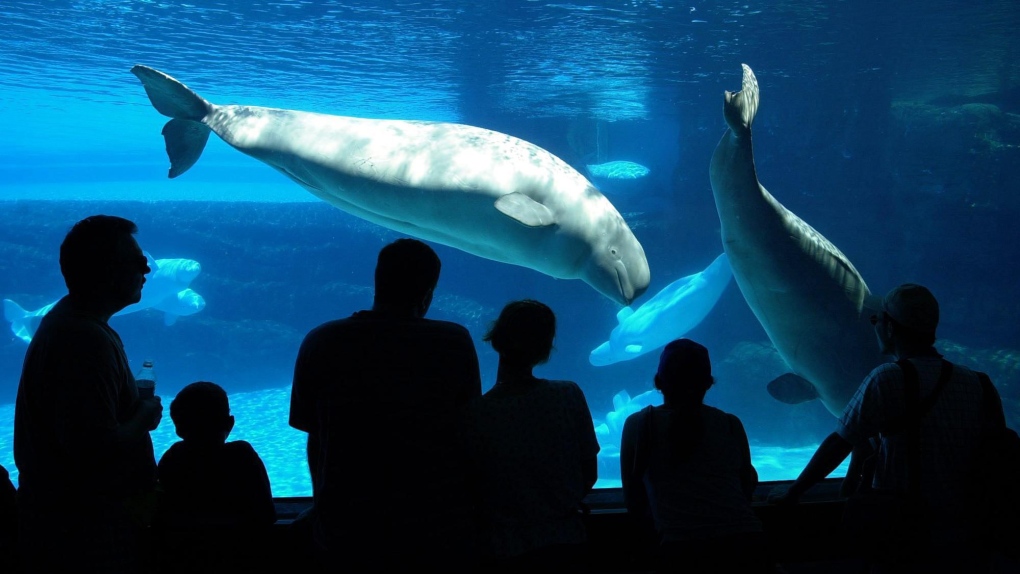Calls for transparency on Marineland's dwindling beluga whale population grow louder as ministry inspection continues
 Beluga whales at Marineland of Canada in Niagara, Ont. (Steve Tracy/ Dreamstime)
Beluga whales at Marineland of Canada in Niagara, Ont. (Steve Tracy/ Dreamstime)
Animal rights organizations are calling for greater transparency into how many beluga whales have died in recent years at Marineland in Niagara Falls, Ont., and whether the conditions at the facility are attributing to their deaths.
The amusement park and aquarium has not been able to breed any new belugas since the passing of federal law (Bill S-203) in 2019, prohibiting the capture and breeding of whales and dolphins in captivity — something animal advocates say once masked the number of beluga deaths at the park each year.
“Roughly the same number of belugas died as were born before the breeding ban, so that's why the numbers didn't really change,” Diane Fraleigh, a member of the Ontario Captive Animal Watch, told CTV News Toronto.
Despite numerous attempts to reach Marineland beginning in August and as recently as November, the park hasn’t responded to interview requests made by CTV News Toronto nor provided a statement on how many belugas are housed at the facility. Marineland’s website does not disclose the number of whales at the park.
For years, the park’s beluga population hovered in the mid-fifties.
 A sign for Marineland is shown in Niagara Falls, Ont., Monday, August 14, 2017. (THE CANADIAN PRESS/Tara Walton)
A sign for Marineland is shown in Niagara Falls, Ont., Monday, August 14, 2017. (THE CANADIAN PRESS/Tara Walton)
The most recent population figure was provided in 2019 when Marineland president Marie Holer signed an affidavit, filed with the U.S. National Oceanic and Atmospheric Administration, stating that the facility was home to 54 beluga whales. The affidavit coincided with the passing of Bill S-203 and, in turn, required Holer to promise the park would prevent further expansion of its beluga population.
Fraleigh said that her organization believes the number of belugas at the park today is no higher than 40, adding that a member of her organization entered Marineland on Sept. 25, taking photos and video of the publicly visible beluga tanks. On that day, Fraleigh said the volunteer was able to count 39 belugas within the park.
A separate video, filmed by another animal rights advocate, and viewed by CTV News Toronto, shows a uniformed Marineland employee telling patrons that the facility is home to 40 whales. The video was taken on Sept. 4.
When a whale dies or is transferred to another facility, Marineland is required to retain paperwork on the incident under the Provincial Animal Welfare Services Act and make it available for authorities to inspect. The information is not accessible by the public.
The Animal Welfare Services (AWS) department at the Ministry of the Solicitor General has declined to provide the beluga death reports to CTV News Toronto, citing an ongoing inspection at Marineland that began early this year.
Freedom of Information requests submitted to AWS at the Ministry of the Solicitor General by CTV News Toronto were also denied due to the investigation.
Five belugas were transferred to Mystic Aquarium in Connecticut this year — an agreement grandfathered into the passing of Bill S-203. Accounting for the transferred mammals, it appears at least nine belugas have died at Marineland since 2019 — an average of four to five per year.
Fraleigh says that number aligns with Marineland’s average yearly death rate, which she has been unofficially tracking since 2013 through photo and video evidence collected by volunteers within OCAW.
This number of deaths may be higher than that at similar institutions due to Marineland’s total beluga population being significantly higher than the industry average.
According to the U.S. National Oceanic and Atmospheric Administration, there are currently 38 beluga whales in captivity in the entire United States, spread between six facilities — fewer than Marineland has at its one Canadian facility.
Marineland’s mammal veterinarian, Dr. June Mergl, also did not respond to requests for an interview or comment.
The facility’s lawyer, Andrew Burns, responded by saying he was “external counsel” and could not provide comment on behalf of the park.
CTV News Toronto additionally reached out to marine mammal specialists and trainers of Marineland, all of whom declined to confirm the number of beluga whales currently housed at the facility or provide comment.
A former employee of the park’s restaurant told CTV News Toronto employees were made to participate in meetings about “what [they] couldn't say to the news while [they] were [employed] there.”
‘IN DISTRESS’: CONDITIONS QUESTIONED
In July, the Canadian Press reported that AWS inspectors had found that all marine mammals at the tourist attraction were “in distress” due to poor water quality.
Two months earlier, AWS inspectors issued orders to Marineland to repair the water system in the pools that house beluga whales, dolphins, walruses, sea lions and one killer whale, according to documents obtained from the Animal Care Review Board.
On May 18, Marineland appealed those orders and denied that the animals were in distress, noting that “an unknown number of whale deaths at the park were not related to the water issues.”
When reached for comment, AWS said its ongoing inspection prevents the agency from speaking about Marineland.
Without more public accountability and transparency in the inspection process, Fraleigh said it is hard to understand why the whales may be dying.
“The sediment at the bottom and on the walls of the tank is mostly algae. And sometimes algae is okay. And sometimes it has bacteria. So it's hard to tell what's going on with that,” she said.
Fraleigh believes, at this point, claims of water quality negatively affecting the beluga population remain unsubstantiated and that there are a number of factors that could be contributing to the dwindling population.
“I think captivity is killing them,” she said. “It's just a situation of captivity. These animals don't live as long as they would in the wild.”
Animal welfare advocate Steven Huxter, featured in the documentary “Blackfish,” told CTV News Toronto that there are a “myriad” of things that could contribute to the death of Marineland’s belugas.
“When you have a whole lot of animals in a smaller environment — that's just not a balanced social structure,” he said.
“It could be animals getting more aggressive with one another and, you know, a head injury or an internal injury of some sort, or it could be food quality, or what type of quality of vitamins are they giving the animals.”
 Almost 10 years ago, tourists line up at a viewing area to see two Marineland attractions, a Killer Whale calf swimming with its mother and a small pod of Beluga Whales in Niagara Falls, Ont. on Wednesday July 18, 2001. (CP PHOTO/Scott Dunlop)
Almost 10 years ago, tourists line up at a viewing area to see two Marineland attractions, a Killer Whale calf swimming with its mother and a small pod of Beluga Whales in Niagara Falls, Ont. on Wednesday July 18, 2001. (CP PHOTO/Scott Dunlop)
Camille Labchuk, executive director at Animal Justice Canada, told CTV News Toronto that she believes the dwindling beluga population at Marineland is “highly concerning.”
In July, Animal Justice filed a legal complaint with AWS over the care of Marineland’s one remaining orca, Kiska. More recently, they’ve filed a complaint alleging the park’s dolphins are being made to participate in daily shows, an activity banned when Bill S-203 was passed.
Labchuk says that water quality isn’t the only concern regarding the belugas.
“The other concern that people have repeatedly raised is overcrowding. [It] sounds like there are about 40 belugas, though we don't actually know the truthful number because Marineland has never publicly revealed it,” she said.
CALLS FOR TRANSPARENCY
Other zoos and aquariums provide greater insight into their animal populations.
The Toronto Zoo, Canada’s largest zoo, said it provides full transparency surrounding animal births and deaths at the facility.
“We are exceptionally transparent with regards to births and deaths,” spokesperson Jennifer Tracy told CTV News Toronto.
“For example, we were transparent in the spring when we had three tiger cubs that were born and only one survived.”
Tracy says that the zoo shares the news of almost all of its animal deaths on their social media accounts and will readily provide information on animal deaths to anyone who inquires.
The Vancouver Aquarium, accredited by the Canadian Association of Zoos and Aquariums (CAZA), follows CAZA’s guidelines when it comes to recording animal deaths, which requires a necropsy report to be filed internally. Whether CAZA-accredited institutions should provide that information to the public is within their own discretion.
Marineland is not accredited by the Canadian Association of Zoos and Aquariums.
“There's a problem in our country about transparency,” Fraleigh said. “With anything to do with animals.”
Labchuk says Animal Justice has pushed for Marineland’s reports and findings to be made public.
“If the only person who ever sees these files are Marineland and potentially [the] authorities that investigate, then the public never had the chance to see how bad the conditions are,” Labchuk said.
“We think that's really troubling.”
Animal Welfare Services and the Solicitor General's office could not tell CTV News Toronto when its inspection of Marineland would be complete.
With files from The Canadian Press.
CTVNews.ca Top Stories

Donald Trump says Canada becoming 51st U.S. state 'a great idea'
U.S. President-elect Donald Trump is taking aim at Canada once more, saying it would be 'a great idea' to make it America's ‘51st state.'
After scamming their victims, some con artists go on to scam our courts with impunity
Convicts, including fraudsters, are skipping out on their court-ordered payments to their victims to the tune of tens of millions of dollars across the country, according to figures obtained by CTV W5.
The barriers and benefits as a global bank looks to branch out in Canada
It's not every day, or even every decade, that a big foreign bank decides to have a go at Canada's retail banking market. But Spain's Banco Santander is poised to be among the few that have tried as it nears the all-clear to expand in Canada.
Canadian government announces new border security plan amid Donald Trump tariff threats
The federal government has laid out a five-pillared approach to boosting border security, though it doesn't include specifics about where and how the $1.3-billion funding package earmarked in the fall economic statement will be allocated.
Fall sitting bookended by Liberal byelection losses ends with Trudeau government in tumult
The House of Commons adjourned on Tuesday, bringing an end to an unstable fall sitting that has been bookended by Liberal byelection losses. The conclusion of the fall sitting comes as Prime Minister Justin Trudeau's minority government is in turmoil.
Nissan, Honda confirm talks on closer collaboration but say there's been no decision on a merger
Japanese automakers Nissan Motor Corp. and Honda Motor Co. confirmed Wednesday that they are discussing closer collaboration but denied reports they have decided on a merger.
2 B.C. police officers charged with sexual assault
Two officers with a Vancouver Island police department have been charged with the sexual assault of a "vulnerable" woman, authorities announced Tuesday.
B.C. teacher disciplined for refusing to let student use bathroom
A teacher who refused to let a student use the bathroom in a B.C. school has been disciplined by the province's professional regulator.
Police chief says motive for Wisconsin school shooting was a 'combination of factors'
Investigators on Tuesday are focused on trying to determine a motive in a Wisconsin school shooting that left a teacher and a student dead and two other children in critical condition.


































